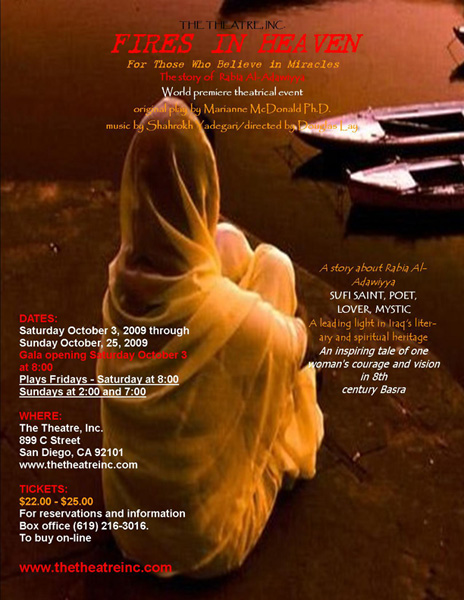FIRES IN HEAVEN


How could a poor eighth-century woman living in Iraq survive on her own, much less become a respected saint? Orphaned while she was young and sold into slavery, Rabia Al-Adawiyya (717-801) was able to help the poor and live a happy life of inner peace. Her sayings and poetry have their honored place in world literature. What challenges did Rabia face personally? Refusing riches, she shows us all the way to happiness.
This is a free dramatic story based on some true facts about Rabia's life. It traces her search for both physical and spiritual survival and traces a night with a thief who came to rob her: he is after her body, and she is after his soul. Who will win?
CRITICS
Fires in Heaven is deeply spiritual and has given me a lot to think about. "The book of my deeds as become as irrelevant to me as Heaven and Hell..." Trust.
I keep telling myself what a marvelous education I am getting, and your thoughts are having a good influence on my life. Fires in Heaven made a really deep impression on me. For some reason it has made me far more conscious of the challenge of the present moment and the value of living as fully and being as productive as productive as I possibly can. Who says you can't teach an old dog new tricks? Denys Horgan, editor, CATHOLIC WORKER
just finished Fires in Heaven it is a poem!so beautiful. I treasured and devoured it and printed out the prayer at the end to keep. You literally made my day what a feat to have made this sufi saint a real human. bravo it should be dropped over iraq for all to read. The world is a better place having you in it Alice Swenson, Professor
This is a very fine piece of work, compelling and moving and congratulations. Brian Quirk, playwright and actor
It is sooo beautifully realized....the way the story is told in scenes juxtaposing the past and future is very powerful, the relationship between the robber and the saint has so many layers and is truly the base of the story while the character of Rabia(sp?) is the gorgeous focal point where everything stems from. Her convictions and beliefs which are tested and
tested are so simple yet true that it leaves one stunned at the end. You have done an amazing job! Tariq Ali, journalist and author
Evoking the spiritual without the overly religious and most importantly,
telling this woman's story. This story must be told. And the music is most important here to set the mood and complement her story. Love the singing!Doug Lay, Director of Theatre, Inc., actor. director, professor
This is excellent now, finely balanced and so thoughtful. Congratulations! Professor J. Michael Walton, scholar, translator, playwright
As a warmup to my writing day, I read Pistachio Stories (by Laura) and Fires in Heaven (by Marianne). What an incredibly eclectic selection of plays we’ll have in our first anthology! These two pieces are not only extremely different from each other, they’re also extremely different from my play (Still Life with Parrot & Monkey). I am heartened to know that there is no way that anyone picking up a copy of this anthology will be bored or find the plays to be redundant or repeating the same old tropes. I was totally engaged by the up-to-date happening-right-now quality of Laura’s play and then, in a heartbeat, was transported to the Middle East of the eighth-century in Marianne’s play to learn of a female saint—a great woman of history and one who was totally new to me. I was happy, also, to see the
resonances in these pieces (which is fabulous, because it was all an accident—I mean, we didn’t select a theme to write about): There is the use of myth in Laura’s play and then, in an entirely different way, a use of myth in Marianne’s play. There is exploration of Middle Eastern culture in both plays—the problems facing Arab Americans in a post-911 society versus a mystic from long ago. There is a seeking of something beyond reality, something that is a mystery, in Marianne’s play, and, again in an entirely different way, a seeking of something beyond reality in my play. In each of the plays I read today, I felt the uniqueness of each piece, but also felt that somehow there was an ephemeral thread that ran through them—and, thankfully, the thread WAS ephemeral and not a whining “woman good/man bad” kind of thing. So, anyway, thank you, my colleagues, for the opportunity to read your work. I’m really happy that our anthology will be so eclectic, bold, and full of spirit.
Paula Cizmar, playwright
This is to express the hope that you are arranging for your fine play on the Sufi lady to be put on stage. It deserves a large and wide audience. The opposition between Sufis and Mullahs has a contemporary significance, and not only in Iran, and Iraq, but in Pakistan also. George L. Huxley, professor and author, member
|